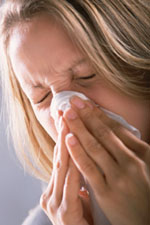The Nine Grossest Things Other People Do That Can Make You Sick
by www.SixWise.com
This article is not for the squeamish or the easily sickened.
This article is for anyone who has ever watched as someone
sneezed into his hand and then came at them for a handshake,
or wondered if that chef who came out of the bathroom really
washed her hands.
That's right. This article, while not all together pleasant,
touches on some things that are quite necessary for you to
know and avoid at all costs if you are to protect your quality
of health. So, forgive us for being a bit direct as we delve
into the nine grossest things other people do that can make
you sick. This information is especially pertinent to the
following groups of people, who are most at risk from germs:
- Young children
- The elderly
- People with compromised immune systems
- Pregnant women
- People with severe illness
- People taking antibiotics or antacids
1. Coughing and sneezing
Serious respiratory illnesses like influenza (the flu), respiratory
syncytial virus (RSV), whooping cough, and severe acute respiratory
syndrome (SARS) are spread by coughing, sneezing and unclean
hands, says the Centers for Disease Control and Prevention
(CDC).
|

Always use a tissue-not your hands-to cover your mouth
when you sneeze. Then be sure to wash your hands afterward.
|
"Droplet spread" is the term used to describe respiratory
droplets from coughs and sneezes that are passed from person
to person. If someone sneezes or coughs near you, particularly
without covering their mouth, droplets will move through the
air and can be deposited on your mouth or nose, or on a desk
or other surface where they can be picked up later.
Robert S. Baltimore, M.D., a professor of pediatrics at Yale
University School of Medicine, said, "Cold viruses and
more serious illnesses, including pneumonia and meningitis,
are spread by the organisms traveling in those little droplets."
Some viruses and bacteria can live for over two hours on
tables, doorknobs and so on, which is why it is so important
for you to wash your hands frequently (keeping a travel-sized
instant hand sanitizer with you is a great way to do this).
You'll be amazed at just how many germs exist in common places
like health clubs, computer keyboards and your
office.
If you notice someone sneeze into their hands, do not shake
them, and be wary of touching things they have touched (pencils,
doorknobs, etc.) if they appear to be sick. If you can't avoid
shaking someone's "sneezed-in" hand, wash your hands
as soon as possible afterward, and don't touch your eyes,
nose or mouth in the meantime.
Don't be a Germ Spreader: Cover your mouth every time you
sneeze or cough-but not with your hands! Use a tissue or,
if one isn't available, your upper sleeve. And, of course,
always throw your used tissue in a garbage can, not on the
floor for someone else to pick up.
2. Nose Diving
Fingers that have been inside a nose are filled with germs
that will be transferred to just about every surface they
touch. Though this is particularly problematic among preschoolers
and young children, adults can do it too.
If you notice someone wiping or picking their nose, be wary
about touching anything they have touched.
Don't be a Germ Spreader: Use a tissue to blow your nose
and always wash your hands afterward. Interestingly, picking
your nose is a prime way to get yourself sick, since germs
on your fingers can easily pass through the nose's thin mucous
membrane.
If your child picks his nose, Michal Nissenbaum, Ph.D., a
psychologist at the Developmental Disabilities Center at the
University of Kansas Medical Center, suggests, "Give
him a toy or a book-anything to occupy his hands."
3. Not Washing Hands After the Bathroom
The number of germs on your hands can double after you use
the toilet, yet, though most people won't admit it, experts
say up to one-third of the population does not wash their
hands after using the bathroom.
|
What's the Best Way to Wash Your Hands? The
Indiana State Department of Health gives these tips
for effective hand washing:
- Use hot or warm running water.
- Lather hands with soap (any kind).
- Rub hands together for at least 10 seconds.
- Wash the back of hands, between fingers, and under
fingernails.
- Rinse with warm water.
- Pat hands dry, beginning at the wrist and moving
down.
- Turn off water, using a paper towel.
|
Unwashed hands can spread not only colds, flus and viruses,
as mentioned above, but also diarrhea and other intestinal
problems. If you don't think washing your hands is necessary,
consider that the CDC says that washing hands is the single
most important way to prevent the spread of infections.
There is a misconception that germs are mostly spread via
the air (such as through sneezing and coughing), which is
echoed by the fact that only 17 percent of Americans wash
their hands after shaking hands. But hands can spread germs
too!
Don't be a Germ Spreader: No one wants to shake hands with
or share a roll with someone who didn't wash their hands after
the bathroom ... so, always wash your hands after using
the bathroom, and not just by running them under water! (See
the box at right for details.)
4. Digging for Gold
This popular pastime mostly applies to young toddlers who
aren't yet aware that picking underwear out of their backsides
isn't socially acceptable, but can also apply to adults who
just don't care that it is.
Again this gets into the possibility of spreading germs from
one, potentially dirty, area to fingers and then to tables,
doorknobs and other surfaces that you may touch. In the case
of preschoolers, Parents Magazine says that children under
4 may lack the motor skills to wipe properly, leading to "sloppy
wiping" that can be quite messy if a parent doesn't step
in to help.
If that child starts gold-digging and then touches other
surfaces, numerous diseases and infections can be spread,
not to mention that the child can become sick himself if he
touches his nose, mouth or eyes.
Don't be a Germ Spreader: If your child has a tendency to
"dig for gold," be sure to assist them in the wiping
process until they are fully able. Discourage them from the
activity by telling your child about how germs are spread
and teach them to wash their hands from an early age.
If you're an adult-invest in a more comfortable undergarment
immediately!
5. Spraying it Not Saying It
How many times have you been in a close conversation with
someone when all of a sudden you feel a spray on your face?
Those tiny drops of saliva that land on your lips, chin, nose,
cheeks or eyes could be full of flu and other respiratory
diseases like tuberculosis.
Spitting on the ground can also transmit disease, particularly
when the saliva dries and particles are swept up into the
air where they can be inhaled.
Don't be a Germ Spreader: Take special care to keep your
saliva in your mouth, especially if you're sick. And, don't
spit indiscriminately on the ground, unless you are choking
and really have a reason to do so!
6. Teeth Pickin'
You finish a tasty meal only to look over at your companion
who's picking away at their molars. Similar to coughing, sneezing
and spitting, this practice has the potential to transfer
germs from the mouth onto the fingers and then onto any surface
the person touches.
Even if a toothpick is used, though preferable to a finger,
saliva can creep up over the stick and onto the hand.
Don't be a Germ Spreader: If you need to pick something from
your teeth, use a toothpick and be sure to wash your hands
afterward. And if you want to impress your guests-don't do
it at the table. Sue Fox, founder and president of Etiquette
Survival, calls picking your teeth the second most common
dining sin.
7. Double-Dipping
Dip a chip, bite it, dip again ... germs! All it takes is
one person to double-dip a chip and the entire bowl of guacamole
becomes ridden with germs and bacteria.
|

The cheese dip at your next party could soon turn into
a germ haven if guests double dip their chips. Including
a serving spoon and individual plates lets guests take
out individual portions rather than contaminating the
entire bowl.
|
Not surprisingly, a survey by Kimberly Clark tissue makers
found that 13 percent of holiday partygoers said they would
avoid foods that could have been plagued by double-dipping.
Don't be a Germ Spreader: Germs from your mouth are inevitably
transferred onto anything you bite-even if it doesn't look
like any saliva is present-so avoid the urge to go back for
more. The best bet is to put some dip on your own plate using
a serving spoon. That way you can double-dip all you want
without sharing your germs with everyone at the party.
8. Clipping Nails in Public
Some estimates say that 95 percent of the bacteria on your
hands is found under your fingernails. So while keeping your
nails short is a good thing bacterially speaking, cutting
them in a public place is not. It is, however, a good way
to spread that bacteria all around.
Margaret Martin, director of infection services at Presbyterian
Hospital, puts it simply, "They [Fingernails] really
are not clean, and they carry germs."
Don't be a Germ Spreader: Scrub, don't wash, under your fingernails
using a fingernail brush. Keep your nails short-Martin says,
"If you can see your nails over the tip of your finger,
then your nails are too long"-and when you clip them,
do it in the privacy of your own bathroom where you can dispose
of the nail clippings properly.
9. Doused in Perfume
People who wear TONS of perfume or cologne are not just unpleasant
to be around-they represent a real health hazard for people
with allergies, asthma or multiple chemical sensitivities.
Chemicals used in perfumes (read
this past article for more on the little-known dangers of
chemicals in cosmetics) are almost entirely synthetic,
as these are cheaper than natural fragrances, and only about
1,500 of the more than 5,000 materials used in fragrances
have been tested for safety.
As many as 30 percent of the public say they have some sensitivity
to chemicals, including fragrances, according to the University
of Texas Health Sciences Center. Even more serious than that,
the American Lung Association reports that exposure to fragrance
chemicals may result in dangerous and painful asthma attacks
in which muscle spasms, fluid and excess mucous obstruct the
airways.
About 14.6 million Americans suffer from these attacks, and
5,000 Americans die, each year as a result. People with sensitivities
to fragrances report symptoms including:
- Nausea
- Dizziness
- Shortness of breath
- Lungs tightening and burning
- Headache
- Extreme fatigue
- Muscle aches and weakness similar to the flu
- Brain fogginess
- Difficulty concentrating
Don't be a Germ Spreader: If you wear perfume, don't use
half the bottle at once-just spray it on lightly-and don't
spray it in a public place. Also, be considerate of those
around you. If you know you'll be in a confined space, such
as on an airplane or train, consider not using it at all.
Sources
Cover
Your Cough
The
All-Time Grossest Kids' Habits
Germs:
They're Everywhere
Double
Dipping to be Avoided
Health
Alert: Fingernail Germs